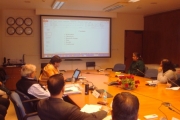On Friday, January 19, 2018, NCAER invited Aradhna Aggarwal, Chair Professor, Indian Studies, Department of International Economics and Management, Copenhagen Business School and held a lecture, “Impact of SEZs on Poverty and Human Well-being in Undivided Andhra Pradesh”. Nilotpal Goswami, Director General, CAG was the discussant for the seminar.
Professor Aggarwal’s joint paper with Ari Kokko, on SEZs, reveals that the passage of the Special Economic Zone (SEZ) Act in 2005 marked a significant development in the Indian economy, as it helped mobilise private investment for industrialisation for the first time in India’s post-Independence economic history. However, the subsequent proliferation of SEZs sparked off a fierce debate in both academic and policy circles over the usefulness of such zones. There were serious concerns about the displacement of farmers necessitated by land acquisition for SEZs, loss of fertile agricultural land, huge revenue loss to the exchequer and the adverse consequences of uneven growth. Despite the persistent controversy and voluminous literature on the subject over the past decade, there is little empirical evaluation of the social impacts of SEZs. In this backdrop, this study evaluates the impact of SEZs on poverty with special reference to undivided Andhra Pradesh, the state with the largest number of SEZs, especially in the manufacturing sector. The authors examine how the presence of SEZs affects human well-being in the wider economy, and estimate the average and distributional effects of SEZs. Their findings point to a positive average treatment effect on the levels of real per capita expenditure in SEZ districts, and to suggestive evidence that people living in urban areas are the major beneficiaries. The preliminary findings of the paper thus do not seem to support the views that Indian SEZs are no better than the status quo or that the country would have been better off in the absence of these zones.
Aradhna Aggarwal, former Senior Fellow at NCAER, is currently Chair Professor, Indian Studies, Department of International Economics and Management, Copenhagen Business School, Denmark, and Advisory Professor, Yunnan University, Kunming Province, China. Aradhna is keenly interested in industry, technology, international trade and investment related issues and has published extensively on these issues. She taught Economics at the University of Delhi from August 1982 to January 2014. During this period, she also had an opportunity to serve at NCAER, Institute of Economic Growth, and Indian Council for Research on International Economic Relations. She worked as an external consultant to international agencies like UNESCAP, ADB, UNDP and the World Bank; the Ministries of External Affairs, Commerce and Information Technology, Government of India; and RIS, among others. She is the principal author of the Kerala Perspective Plan 2030 prepared by NCAER for the Kerala Government. Aradhna received her MA in Economics from Delhi University, and PhD in Industrial Economics from the Delhi School of Economics.
Aradhna’s co-author for the paper is Ari Kokko, Professor and Director of Asia Research Centre in the Department of International Economics and Management, Copenhagen Business School, where he focuses on the role of trade and foreign direct investment in the development process. He has been an advisor and consultant to a number of national governments and international organisations in the Nordic region. He received his BSc in Economics and Economic History from Lund University, Sweden, and his PhD in Economics from the Stockholm School of Economics. He was also awarded an honorary doctorate in Economic Sciences by Tartu University, Estonia.













